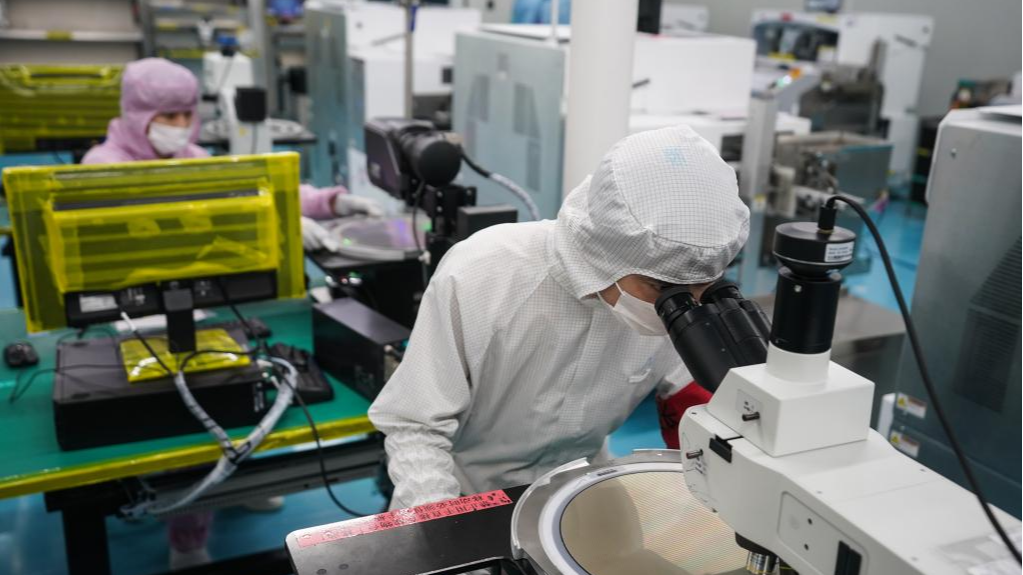By Azhar Azam
The license of the Dutch Advanced Semiconductor Materials Lithography (ASML) to ship some of its equipment to China has been partially revoked, said the Veldhoven-based company in a statement on its website citing discussions with the U.S. government. The move will have a limited impact on China; the latest episode again exposes America's coercive efforts to undermine the trade and technology interests of two sovereign states.
For several years, the U.S. has been forcing the Netherlands to limit chip-making equipment exports to China; the Dutch government resisted, stating it would "not copy the U.S. export restrictions for China one-to-one." "We make our own assessment," said the country's Trade Minister Liesje Schreinemacher in November 2022.
Last year, Washington reportedly called Amsterdam about the matter but was asked to contact the ASML directly. In the recent development, it's revealed the Biden administration has pushed the ASML to cancel shipments of three top-of-the-line deep ultraviolet lithography machines even before export bans were due to come into effect.
Peter Wennink, the company's chief executive officer, publicly exposed the U.S. bullying last year when he warned: "The more you put them (China) under pressure, the more likely it is that they will double up their efforts." The export ban on chip-making equipment will cost the Netherlands billions of dollars as China was estimated to have imported some $3.7 billion worth of these chip-making systems between July and November alone.
America's campaign to prevent China's access to semiconductor equipment began in 2018 under the Trump administration. Amsterdam, under U.S. pressure, withheld an export license in 2019 that would have allowed ASML to ship its extreme ultraviolet machines. Reason being the U.S. couldn't sanction the company given its products didn't make up for more than 25 percent of the U.S.-made components, required to block the ASML from selling to China.
U.S. President Joe Biden continued his predecessor's policy and kept lobbying the Dutch government to deny this equipment to China. This approach has been driven by geopolitics: thwart China's ambitions of self-dependence and ensure America's dominance in the semiconductor industry, which for decades powered the country's hegemony in economy, military and technology.
Reckoning U.S. share of semiconductor manufacturing capacity had dropped to 12 percent, a study by the Boston Consulting Group and the Semiconductor Industry Association projected Beijing to have the world's largest share of chip production by 2030 with East Asia accounting for 75 percent of the global chip production. A new fab in the U.S., it said, would cost up to 50 percent more than the one in China, stoking fears in Washington that Beijing could upend its global dominance and urging it to politicize the trade relationships.
As Europe joined the U.S. technology Cold War with China, Wennink warned it wouldn't prevent China from developing its own semiconductor industry. On the contrary, it could decelerate the European industry. "In 15 years, they'll be able to do it all by themselves – and their market (for European suppliers) will be gone."

Staff members perform tasks at a workshop of HT-Tech (Nanjing) Co., Ltd. in Pukou Economic Development Zone of Nanjing, east China's Jiangsu Province, March 9, 2023. [Photo/Xinhua]
Even American chipmakers expect their government to protect their interests in China which last year was the largest single market, accounting for an estimated of about $180 billion or more than one-third of global semiconductor purchases. After meeting the U.S. Secretary Antony Blinken following his China visit, the U.S. Commerce Secretary Gina Raimondo in last July said the restrictions shouldn't be so broad "that you deny American companies revenue and China can get the product elsewhere."
Rather than addressing their grievances, America opted to shut down other markets for China. Schreinemacher comments in September that the Netherlands had considered "the technological developments and geopolitical context," were a bitter reminder Amsterdam was being forced to take such harsh actions. Washington also pushed other countries to adopt similar measures; South Korea raised concerns about the U.S. Chips Acts for its potential to "deepen business uncertainties (and) violate companies' management and technology rights."
As the U.S. blockade of China's semiconductor industry continues to create disruption, affecting efficiency and innovation globally, and the Biden administration expands measures in an attempt to hobble China's tech growth, these curbs have boosted the capability of the Chinese toolmakers that are getting large orders in the domestic market. Huawei last year caused a stir after the Chinese tech giant launched its Mate 60 Pro with a 7-nanometer chip, exemplifying Beijing can compete with the world's best even without access to U.S. suppliers.
Announcing new rules to halt the shipments of more advanced chips designed by Nvidia and others to China, Raimondo in last October insisted Beijing would still import hundreds of billions of dollars worth of U.S. semiconductors yet the California-based chip designer, which has commanded over 90 percent share of China's artificial intelligence chip market, expected a steep drop in its quarterly sales in China. It has launched a modified version of one of its chips; experts say America's restrictions are helping create opportunities for domestic suppliers.
The SEMI, an association of semiconductor production equipment vendors, says China will be third in fab equipment spending worldwide in 2024. But despite the U.S. constraints, it sees Chinese manufacturers investing in mature process nodes.
This commitment to achieve self-dependence is also reflected in the SEMI's most recent quarterly World Feb Forecast which expects global semiconductor production in 2024 to increase to the tune of 30 million wafers per month (wpm) for the first time on the back of 8.6 million wpm capacity growth in China. This indicates Washington could have delayed Beijing's chip advancement but it cannot overturn China's tech rise.

 中文
中文



